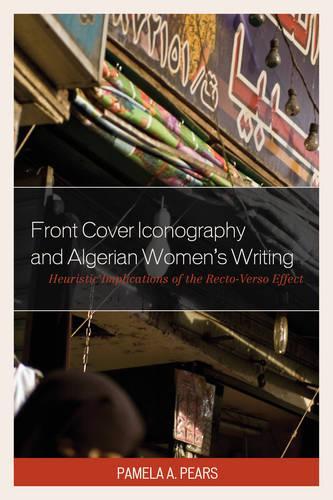
Front Cover Iconography and Algerian Womens Writing: Heuristic Implications of the Recto-Verso Effect
(Hardback)
Publishing Details
Front Cover Iconography and Algerian Womens Writing: Heuristic Implications of the Recto-Verso Effect
By (Author) Pamela A. Pears
Bloomsbury Publishing PLC
Lexington Books
29th October 2015
United States
Classifications
Tertiary Education
Non Fiction
Gender studies: women and girls
840.99287
Physical Properties
Hardback
188
Width 157mm, Height 240mm, Spine 20mm
417g
Description
The front covers of books written by Algerian women serve as the primary source of investigation in Front Cover Iconography and Algerian Women Writers. These covers have implications that extend beyond selling the book. What we see on one side of the pageor in this case, the cover, (recto) controls what we read on the reversein this case, the text itself (verso). Using theories of the paratext, including those of Grard Genette and Jonathan Gray, this book determines how four dominant iconographies used on the covers of Algerian womens writing Orientalist art, the veil, the desert, and the author portrait work with and against the texts they represent. These images have an impact on the initial reception of the book, but beyond that, book covers determine how both the informed and uninformed reader categorize and interpret francophone Algerian womens writing in France and beyond. As the covers help to sell the works, they also produce messages, represented via their iconographies that embed themselves into the texts. A sometimes explicit, and at the very least, implicit dialog between the visual paratextual representation and the written textual one is created: a dialog that extends beyond the life of the physical book to a sort of canonical paradigm for reading these authors works. Thus, even if the cover image appears ephemeral, it never truly disappears. Its powerful control over critical reception and, ultimately, interpretation of francophone Algerian womens writing remains.
Reviews
Front Cover Iconography and Algerian Womens Writing provides unprecedented insights into the ways in which the paratext participates in the process of making meaning when it comes to reading and interpreting works of literature by women writers with a connection to Algeria. Pamela Pears compels us in this fascinating study to consider these literary creations as a whole, taking into account the complex factors that contribute to the presentation of works by Nina Bouraoui, Assia Djebar, and Malika Mokeddem. * H-France Review *
Pearss literary and visual analysis is excellent, accurate, and detailed. The study is very well researched and organized. The book represents a significant contribution to knowledge in the field. It is consistently strong throughout, especially in the section on Djebar and Orientalist painting. This is all the more remarkable given the large amount of scholarship dedicated to Djebars works. This superb study will be profitably read by specialists of Algerian and French literature and scholars interested in postcolonial, feminist, and visual arts issues. Because it is written in a clear style that is enjoyable to read, the book can also be assigned in graduate and even undergraduate student courses, where it will be effective in helping students learn to analyze the ideological ramifications of visual and literary representations and to read the texts both with and beyond such constraining frameworks. The publication of this book also confirms the continuing scholarly excellence of Lexington Books After the Empire series, which has established itself as one of the top publication outlets for francophone postcolonial studies. * Contemporary French Civilization *
Pamela Pearss study adopts an original approach to reading francophone literature in its focus not only on the text but also on the paratext. Taking three important Algerian women writers as her focus Assia Djebar, Nina Bouraoui, and Malika Mokeddem Pearss textual readings set up a dialogue between word and image, and examine the works content alongside the marketing strategies deployed by their publishers. . . .Pearss analyses are lively and engaging, then, and open up productive new perspectives on the works themselves. . . .[T]he book is an engaging read, and certainly helps to raise new questions about the rapidly developing field of francophone Algerian literature. * French Studies *
This passionate, original work addresses the role that the paratextual components (cover illustration, dust jacket, banner, promotional description, author bios, etc.) play in the interpretation of works produced by Algerian writers, writers of Algerian origin, or writers with a connection to Algeria.... [W]e highly recommend this work that, beyond Maghreb or strictly francophone studies, will immediately appeal to every reader interested in the relationship, and the meaning of the relationship, between the image (recto) and the text (verso). [Translated from the original French] * French Review *
In this refreshingly original and important study, Pears discusses the complex impact of paratexts in a number of canonical North African texts. Insightful and thought-provoking,Front Cover Iconography and Algerian Womens Writingfurther reexamines popular topoi, such as the desert and the veil, and their manifold heuristic implications in novels, testimonials, and translations. Pears invites her readers to critically revisit well-known texts in light of potentially misleading embedded paratextual messages. A must-read for any Maghreb specialist or aficionado. -- Christa Jones, Utah State University
This is a beautifully conceived and clearly written study that examines the intricate interconnections between text and image in the publications of Algerian women writers. -- Alison Rice, University of Notre Dame
Author Bio
Pamela Pears is associate professor of French at Washington College.
